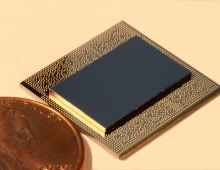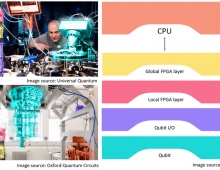
Honeywell to Develop The World’s Most Powerful Quantum Computer
Honeywell says it has achieved a breakthrough in quantum computing that accelerates the capability of quantum computers and will enable the company to release the world’s most powerful quantum computer within the next three months.
The company also announced it has made strategic investments in two leading quantum computing software providers and will work together to develop quantum computing algorithms with JPMorgan Chase.
Within the next three months, Honeywell will bring to market the world’s most powerful quantum computer in terms of quantum volume, a measure of quantum capability that goes beyond the number of qubits. Quantum volume measures computational ability, indicating the relative complexity of a problem that can be solved by a quantum computer. When released, Honeywell’s quantum computer will have a quantum volume of at least 64, twice that of the next alternative in the industry.
In a scientific paper, Honeywell has demonstrated its quantum charge coupled device (QCCD) architecture, a major technical breakthrough in accelerating quantum capability. The company also announced it is on a trajectory to increase its computer’s quantum volume by an order of magnitude each year for the next five years.
This breakthrough in quantum volume results from Honeywell’s solution having the highest-quality, fully-connected qubits with the lowest error rates.
“Building quantum computers capable of solving deeper, more complex problems is not just a simple matter of increasing the number of qubits,” said Paul Smith-Goodson, analyst-in-residence for quantum computing, Moor Insights & Strategy. “Quantum volume is a powerful tool that should be adopted as an interim benchmarking tool by other gate-based quantum computer companies.”
Honeywell Chairman and Chief Executive Officer Darius Adamczyk said companies should start now to determine their strategy to leverage or mitigate the many business changes that are likely to result from new quantum computing technology.
To accelerate the development of quantum computing and explore practical applications for its customers, Honeywell Ventures, the strategic venture capital arm of Honeywell, has made investments in two leading quantum software and algorithm providers Cambridge Quantum Computing (CQC) and Zapata Computing. CQC has expertise in quantum software, specifically a quantum development platform and enterprise applications in the areas of chemistry, machine learning and augmented cybersecurity. Zapata creates enterprise-grade, quantum-enabled software for a variety of industries and use cases, allowing users to build quantum workflows and execute them freely across a range of quantum and classical devices.
Honeywell also announced that it will collaborate with JPMorgan Chase, a global financial services firm, to develop quantum algorithms using Honeywell’s computer.
Honeywell first announced its quantum computing capabilities in late 2018, although the company had been working on the technical foundations for its quantum computer for a decade prior to that. In late 2019, Honeywell announced a partnership with Microsoft to provide cloud access to Honeywell’s quantum computer through Microsoft Azure Quantum services.
Honeywell’s quantum computer uses trapped-ion technology, which leverages numerous, individual, charged atoms (ions) to hold quantum information. Honeywell’s system applies electromagnetic fields to hold (trap) each ion so it can be manipulated and encoded using laser pulses.
Honeywell’s trapped-ion qubits can be uniformly generated with errors more well understood compared with alternative qubit technologies that do not directly use atoms.





















